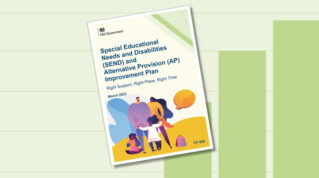Earlier this year, the DfE published a clear-sighted green paper on the Special Educational Needs (SEND) system in England. Its appraisal of the many challenges faced by our most vulnerable children is commendably honest. Despite record and ever-increasing funding, it concludes, the SEND system is failing. It costs an eye-watering amount of money, isn’t improving outcomes, and navigating it is often a deeply unsatisfactory and even upsetting experience for young people and their families.
We read it closely, because this is more than professionally important for us. We both have children who inhabit this world. Tom’s son Freddie has Down’s syndrome and autism, while Ben’s daughter Bessie has Williams syndrome. Both have learning disabilities which will always make academic work harder for them.
The green paper makes some sensible suggestions about how the system of resource allocation might be improved, but we think there is a more fundamental challenge that it does not recognise. Our SEND system rests on an outdated medicalised and deficit model, where additional needs (and by association, the people with them) are seen as something wrong that should be fixed.
This way of viewing additional needs and disability has led to a system where to receive additional support, people with disability and their families must navigate bruising processes which require them to demonstrate failure, regularly and repeatedly.
Parents of children with a disability, like us, know this demeaning game well. As Barney Angliss writes in the researchED guide to SEND, “it often seems the only way for young people with SEND – or their parents and carers – to get help is to characterise themselves as ‘impaired’, somehow less.”
This system lacks dignity. It is unnecessarily disrespectful for people with learning disability and their families. And this problem of deficit framing is rooted in a wider societal context of ‘meritocracy’ – a sort of sorting principle according to which the successful are assumed to have earned their accolades and the rest are assumed to deserve their failures. The issue is that our meritocratic framing only values a limited number of success measures: academic credentials, wealth and occupational status. It’s a narrow conception of a ‘good life’.
The SEND system is disrespectful of people with learning disability and their families
Such framing is troubling. It suggests that to achieve success Freddie and Bessie need to be transformed into people other than they are. Nobody who knows them wants this, because they are complete humans.
The green paper in its current form does not sufficiently challenge this orthodoxy. It still frames SEND as a group of defects that can and should be educated out of people. But there are no ‘better’ versions of Bessie and Freddie without their learning disabilities. They will always have them. And they are not unwell.
We think it’s possible to make the SEND system more efficient and affirmative, and to do that we have to articulate a fuller and more inclusive vision of what it means to live well.
Last week, the Confederation of School Trusts published our paper which makes some suggestions as to how we might do this. There are no easy solutions, but significant steps forward can be made through:
- More affirmatory language that doesn’t imply those who struggle to learn are failing.
- A more dignified process for identifying and supporting children with SEND that moves beyond the medicalised model and doesn’t require failure before accessing support.
- A broader concept of a ‘good life’ with a wide range of success measures so all children have opportunities to achieve recognition and honour for their work.
- A clearer understanding of the difference between specific learning difficulties that can be overcome and variation in rates of learning that are part of someone’s identity.
We should of course celebrate academic and other meritocratic achievement. Ten grade 9s at GCSE is impressive and children who reach such heights should be recognised.
But we want children like Freddie and Bessie to have opportunities for recognition and honour too. We want the education system to see them as we do – complete, fully realised people with important and beautiful qualities who, like all of us, need more help from time to time.
And we want other parents of children like them – especially those who are less able to navigate the SEND system – to have a voice in all this, and easier access to that help.

















Your thoughts